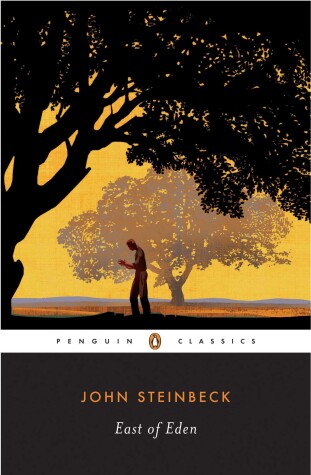
girlinthepages
Written on Apr 22, 2014
I think that the real strength of Steinbeck’s writing is his ability to write generations worth (literally) of fleshed out characters. Even the peripheral characters who played any sort of role had a history and a sense of realness about them, and it was impossible not to feel any empathy for them (even Cathy, who is downright frightening). By the end of the 600 pages in this novel the reader has literally felt as though they’ve experienced the trials and accomplishments of each and every family. Most interestingly, Steinbeck writes himself into the novel as the narrator and a severely minor character, the son of the daughter of a main character. This narration technique is interesting, because it calls into question how reliable the voyeuristic retelling of a character of miniscule importance is.
Steinbeck also tackles multiple heavy issues that are huge questions that impact the human condition, such as: can a human be inherently good or inherently evil? Can humans ever overcome the death of a loved one? What is the implication of choice rather than command? Are some characters truly unredeemable? What happens when we fall in love with our idea of a person rather than that person’s reality? He expertly weaves the tale of Eden and Cain and Abel into the narrative synthesizing it with the events of the late 1800s into the early 1900′s, such as World War I, the settling of the California Central Valley, and the increase of technology such as the shift to automobiles. Steinbeck has clearly done his biblical research as well, as his writing shows not only an influence of the Hebrew Scriptures, but actual debate, mainly through Lee and Sam Hamilton, as to what kind of truth the Bible holds, and how translation has colored interpretation of the narrative (at one point they actually argue the meaning of the Hebrew word timshel, and I was jumping up and down because it’s exactly the type of thing I would do in one of my religious studies classes). Steinbeck takes a hugely important Christian narrative and manages to be influenced by it while also critiquing it as well.
The reason this book didn’t get a full five star rating from me was because of the gender based interpretation of the story of Genesis that painted the “Eve” based character as one of the most evil, apathetic, and salacious characters of all time. While she was so horrifying that it was impossible to stop reading, this misappropriation of Eve’s role in the Bible and in the Abrahamic traditions is one that I don’t subscribe to as it sets the foundation for sexism and the view that women are inherently inferior, weak, and impulse-driven, and who need to be controlled lest they spread evil throughout the world (and my paper will use this character to depict how the Eve character is stigmatized in literature). Steinbeck does slightly redeem himself by creating a character, Abra, later on who is an opinionated female who doesn’t pretend to hide her flaws unlike some of the holier-than-thou male characters. *End Rant*
Favorite Characters:
Sam Hamilton- I’ve never read a character who radiated so much pure joy and enjoyment for life, learning, and asking questions in order to achieve knowledge. If I could choose any literary character to be my dad or grandpa, it would be Sam Hamilton.
Lee- A character who displays the struggle of Chinese-Americans and the stigmas they faced in developing California as a minority exploited for labor, Lee is one of the wisest characters who has a gift for pointing out uncomfortable truths, such as that it’s easier on the majority population to think minorities are inferior to them then to acknowledge the intelligence of an outside group. Plus, he’s often really hilarious in a really intelligent way, and comes to be a true part of Adam’s family.
Cal- I don’t know if the reader is supposed to walk away liking Cal, but I really did. He’s the character who was perhaps the most real depiction of the human condition, as he struggles with both goodness and darkness inside of him and acknowledges both sides of himself, and that he has control over himself, rather than letting his heritage define him.
This book also had some phenomenal quotes:
“When a child first catches adults out- when it first walks into into his grave little head that adults do not have divine intelligence, that their judgements are not always wise, their thinking true, their sentences just- his world falls into panic desolation. The gods are fallen and all safety gone. And there is one sure thing about the fall of gods: they do not fall a little; they crash and shatter or sink deply into green muck. It is a tedious job to build them up again; they never quite shine. And the child’s world is never quite whole again. It is an aching kind of growing.” (Steinbeck 20)
“It is one of the triumphs of the human that he can know a thing and still not believe it.” (Steinbeck 452)
Overall Thoughts:
East of Eden is a phenomenal read and Steinbeck has a truly timeless and uncanny insight into the truths about the human condition (if you need proof, see the quotes above). While it’s a long read, it’s worth it, and you’ll walk away with that feeling of profound knowledge when you’ve read a book that will stick with you for the rest of forever.

